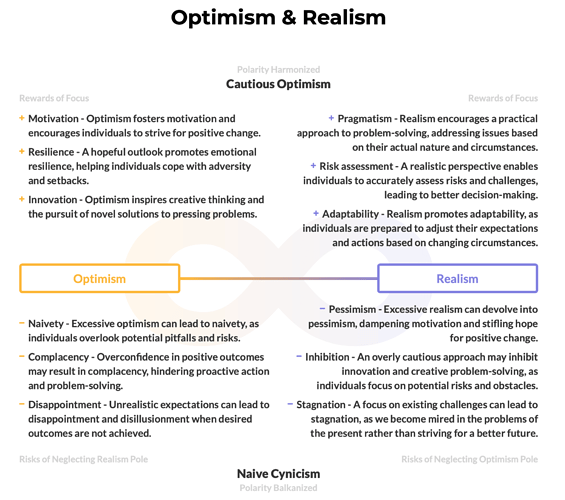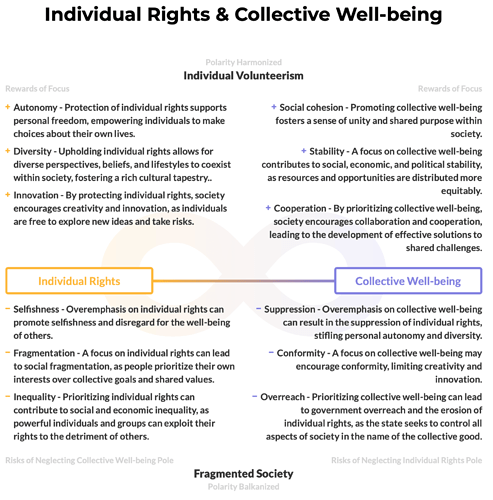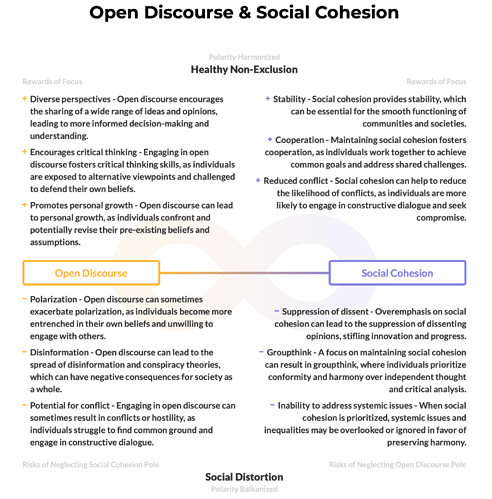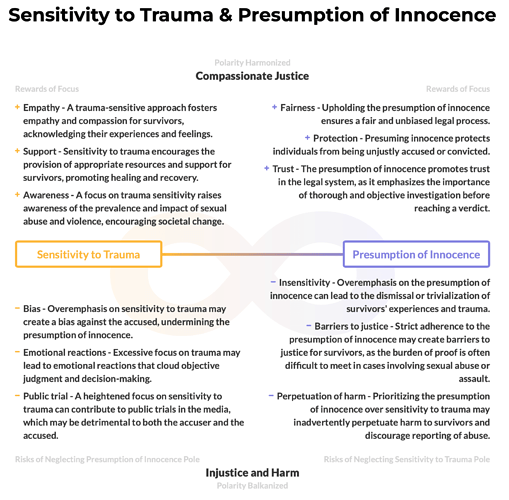In this thought-provoking podcast discussion, Mark Fischler and Corey deVos delve into the intricacies of Trump’s legal battles, the pursuit of accountability in politics, and the complexities of maintaining empathy and justice in a polarized society. They explore the significance of the January 6th Capitol insurrection and the ongoing investigation into election interference, as well as the pressing need for society to become more aware of trauma, particularly in cases of sexual abuse and rape. For an Integral Theory audience, this conversation artfully surfaces the pain points and challenges that arise from polarities such as individual rights versus collective well-being, and sensitivity to trauma versus the presumption of innocence.
Mark and Corey touch on the intensifying culture war in America, as evidenced by the internal war within the GOP, and the emergence of dysfunctional identities within broken systems. They address the impact of social media-induced dysmorphia on mental health and the need for integral solutions and exposure to different perspectives to foster acceptance. Furthermore, they discuss the role of the judiciary in upholding democratic principles, focusing on the ethics of Supreme Court Justices and the need for accountability and oversight in their lifetime appointments.
Throughout the conversation, Mark and Corey emphasize the importance of engaging with people from different walks of life and fostering understanding and listening to different perspectives. They call for putting aside the political lens and interacting with people as individuals, highlighting the need for civics education and experiential learning to deepen our appreciation of the moral and philosophical basis behind historical events. This insightful discussion invites listeners to grapple with the complexities of the current political and cultural landscape, while holding onto hope that in the midst of chaos, something new and integral will emerge.
Here are some of the most critical polarities to consider while listening to this broadcast.
Polarity: Optimism and Realism
Mark and Corey discuss a range of political, legal, and social issues, exploring the implications of different perspectives and potential outcomes. This highlights the need to balance optimism and hope for a better future with a realistic understanding of the current situation and the challenges that must be faced. The conversation emphasizes the importance of adopting a balanced perspective when considering possible solutions and addressing complex issues.Integrated Polarity:
Cautious Optimism - Balancing optimism and realism to foster a sense of cautious optimism, enabling individuals to maintain motivation and resilience while addressing challenges with a practical, grounded approach. This balanced perspective is essential for effectively addressing complex political, legal, and social issues, as demonstrated in the podcast episode.
Disintegrated Polarity:
Paralyzing Cynicism - Either prioritizing optimism to the point of naivety and complacency or prioritizing realism to the point of pessimism and inhibition. This results in a paralyzing cynicism that hinders effective navigation of complex issues and prevents the implementation of meaningful change, as evidenced by the exploration of various political, legal, and social challenges in the podcast discussion.
Polarity: Individual Rights and Collective Wellbeing
The discussion around various political and legal issues, such as the investigations into former President Trump, abortion laws, and non-conventional gender identities, reveals the need to balance the protection of individual rights and liberties with the promotion of collective well-being and societal harmony. Mark and Corey explore the implications of different political decisions and their impact on both individual rights and the broader society, touching on themes like accountability, inclusiveness, and the importance of open dialogue.Integrated Polarity:
Individual Volunteerism - Balancing individual rights and collective well-being by fostering individual volunteerism, where people actively contribute to the betterment of society while maintaining their personal freedoms. This balanced approach encourages active participation in addressing complex political, legal, and social issues, as demonstrated in the podcast episode.
Disintegrated Polarity:
Fragmented Society - Either prioritizing individual rights to the point of neglecting collective well-being or prioritizing collective well-being to the point of undermining individual rights. This results in a fragmented society that struggles to effectively navigate complex issues and implement meaningful change, as evidenced by the exploration of various political, legal, and social challenges in the podcast discussion.
Open Discourse and Social Cohesion
In this episode, the challenges of addressing contentious political, legal, and social topics are discussed. This polarity highlights the importance of balancing open discourse, where diverse opinions can be expressed and debated, with maintaining social cohesion, where communities can function harmoniously.Integrated Polarity: Healthy Non-Exclusion
Balancing open discourse with maintaining social cohesion leads to healthy non-exclusion, a concept from Ken Wilber’s Integral Theory, where diverse perspectives can be shared and explored while still promoting cooperation, understanding, and harmony among individuals and communities. This approach acknowledges and includes the partial truths in each viewpoint, fostering an environment that values both individual expression and collective well-being.
Disintegrated Polarity:
Social distortion - An imbalance between open discourse and maintaining social cohesion, resulting in either an anarchic society with unfettered self-expression and disregard for collective well-being (Brave New World) or a repressive society where homogeneity and control suppress diversity and critical thinking (1984). This distorted social fabric undermines the potential for a flourishing and inclusive community.
Polarity: Sensitivity to Trauma and Presumption of Innocence
This polarity involves finding a balance between sensitivity to trauma, particularly in cases involving sexual abuse and rape, and upholding the presumption of innocence. It is relevant to the discussion as it addresses the challenges of managing public allegations and ensuring justice for all parties involved.Integrated Polarity:
Compassionate Justice - Balancing sensitivity to trauma and presumption of innocence by fostering compassionate justice, an approach that acknowledges the experiences and needs of survivors while also upholding the fundamental principle of innocent until proven guilty. This balanced perspective is essential for addressing complex legal and social issues in a fair and empathetic manner, as demonstrated in the podcast episode.
Disintegrated Polarity:
Injustice and Harm - Either prioritizing sensitivity to trauma to the point of undermining the presumption of innocence or rigidly adhering to the presumption of innocence at the expense of trauma survivors. This results in an imbalanced approach that perpetuates harm and injustice for both survivors and the accused.
Topics include:
Trump's Legal Woes Trump has been accused of reimbursing Michael Cohen for payments made to women who could potentially embarrass Trump before the 2016 presidential election. Alvin Bragg is considering charging Trump with a felony violation of state election laws, which could result in probation. However, there is uncertainty as to whether federal law preempts state law, and the charges may be seen as a technicality rather than a serious crime.Comparisons to the Bill Clinton Affair
The conversation compares the prosecution of Bill Clinton and Donald Trump, and mentions a civil case where E.Jean Carroll sued Trump for rape and defamation. The rape allegedly happened in the 1990s, and Trump denies the allegations. The case is currently happening in Manhattan. The context discusses the tricky topic of type-type rhetoric and the difficulty of proving allegations of sexual assault from years ago.
Supporting Women
The discussion between Corey deVos and Mark Fischler touches upon the issue of supporting women and the impact of assault on one woman affecting all women, while also emphasizing the presumption of innocence. They also discuss the ongoing investigation about interference and obstruction related to the 2020 US presidential election.
Awareness of Trauma
Mark and Corey discuss the need for society to become more aware of trauma, particularly in cases of sexual abuse and rape. It highlights the challenge of remaining sensitive while also acknowledging the existence of false allegations. The speaker shares a personal experience of being falsely accused of sexual assault, emphasizing the trauma and devastation that come with such accusations and highlighting the importance of clear thinking and staying open to facts in cases like Donald Trump’s.
January 6th Capitol Insurrection
The context discusses the significance of the non-peaceful transfer of power on January 6th and its impact on American identity. The speakers argue that those who undermine democratic principles must be held accountable and the rule of law must be respected. Mark and Corey discuss the issue of holding those accountable for attempting to undermine the election, and believes there is evidence pointing towards deliberate efforts to do so.
Internal War Within GOP & Culture War in America
The context discusses the current internal war within the GOP and the intensifying culture war in America. The author notes that the developmental stages of development are pulling away from each other, potentially leading to a warm civil war. The speakers discuss their concerns about the current state of politics, culture, and economics, but also hold onto hope that in the midst of the chaos, something new and integral will emerge. They touch on the importance of reflecting on why certain approaches don’t work, and how acute problems are necessary to bring about change.
Election Interference & Legal Ramifications
One speaker cites an example of a district attorney in Georgia and the pressure on officials to change votes. A recording of President Trump pressuring Georgia’s Secretary of State to “find” 11,800 votes. Further discussion on potential legal ramifications for election interference and related crimes, before moving on to a cultural shift towards ultra MAGA conservatism in Tennessee. Lawmakers in Tennessee and Montana are facing criticism for using the word “insurrection” to justify the expulsion of Democratic lawmakers and the ban of gender affirming care. Critics argue this is part of a larger attempt by conservative movements to push their culture war agenda, and to dilute the impact of the word “insurrection”.
Political Hypocrisy & Value of Rules
Additionally, a recent vote on gun control in Tennessee has been criticized for being undemocratic and partisan. There is a history of politicians protesting on the floor of the House and not being expelled, but a recent incident involving a member being silenced for speaking out has sparked conversations about political hypocrisy and the value of rules versus multiple perspectives.
Social Media Induced Dysmorphia
The loss of dialogue and diversity in politics is a concern for Mark Gaffney, who sees deliberate efforts to create super majorities in states and extreme views taking hold. He believes that without inclusivity and democracy, our democracy is at risk. Social media’s perverse incentives and sorting algorithms have created a culture of constant conflict and epistemic bubbles leading to social media induced dysmorphia, exacerbated by filters on apps like TikTok and Instagram. This dysmorphia is causing an increase in non-conventional identities.
Dysfunctional Identities within Broken Systems
The emergence of dysfunctional identities within broken systems is a concern. Dysmorphia is a serious issue, and providing gender-affirming care is often the best option for those affected, particularly in the transgendered community where the suicide rate is tragically high. Conversations need to be had about systemic causes of dysmorphia and how to best take care of those affected.
Left vs Right Approach
The left promotes full acceptance and self-expression, but this can lead to illiberal tactics. The issue is particularly complicated for adolescents. The speaker talks about the complexity of gender identity and the need for caution in making decisions around it for children. They also express concern about the impact of social media on mental health and hope for a solution through technology. Finally, they discuss the interplay between extreme positions on the issue.
The Pain Felt by Marginalized Groups
The context discusses the pain felt by marginalized groups including LGBTQ+ individuals due to worsening societal issues. It also mentions the role of social media and the need for integral solutions and exposure to different perspectives for acceptance.
The Woke Movement
The speaker expresses concern that the woke movement is creating a regression from Green to Amber, and that academic institutions may not be producing enough Green thinkers, potentially damaging progress. They also mention the “left-handed dynamic” as a possibility for the increase of woke individuals. Increased acceptance and technological advancements may be contributing to the rise in transgender identities. The “left-handed effect” suggests this trend will plateau and normalize over time.
Justice Clarence Thomas Accepting Gifts
ProPublica investigated Justice Clarence Thomas accepting gifts from a conservative billionaire. Supreme Court Justices, including Clarence Thomas and Neil Gorsuch, have been criticized for accepting lavish gifts and trips without disclosing them. This raises concerns about the impartiality and ethics of the judiciary. The conversation discusses the potential influence of wealthy donors on Supreme Court judges, particularly in regards to Justice Clarence Thomas and his relationship with billionaire Harlan Crow. The conversation also mentions new accounting rules that would require disclosure of Thomas’ activities, but questions whether they have any real impact. The need for Justices to recuse themselves is emphasized.
Individuals with Higher Levels of Consciousness
Corey and Mark talk about how individuals with a higher level of consciousness would not go on lavish trips because they understand the implications of their actions. Examples of individuals with this level of consciousness are provided.
The Need for Accountability and Oversight
The need for more people in positions of power and politics, particularly in the judiciary, and the lack of oversight in the lifetime appointments of Supreme Court Justices is discussed. Accountability and oversight are essential to maintain democratic institutions and prevent a regression towards social entropy. Lack of accountability can lead to the erosion of stability and hard-won rights.
Civics Education as a Solution
Civics education is suggested as a solution, with an example of a trip to experience historical sites. The importance of understanding the moral and philosophical basis behind historical events is emphasized, particularly in regards to the Civil War and the presidency of Abraham Lincoln.
The Need for Interaction Between Different Walks of Life
Engaging with people from different walks of life is highlighted as important for civic participation. Politics has become the primary lens through which people view the world; Corey calls for putting aside this lens and interacting with people as individuals. They also discuss a trip to Europe and meeting people from different backgrounds, emphasizing the importance of understanding and listening to different perspectives.
Inclusivity Across Developmental Stages
It is imperative for those at later developmental stages to be inclusive of those at earlier stages to fully appreciate the range of human wisdom. The speakers encourage embodying curiosity towards all beings, as it allows for more meaningful and full conversations.




